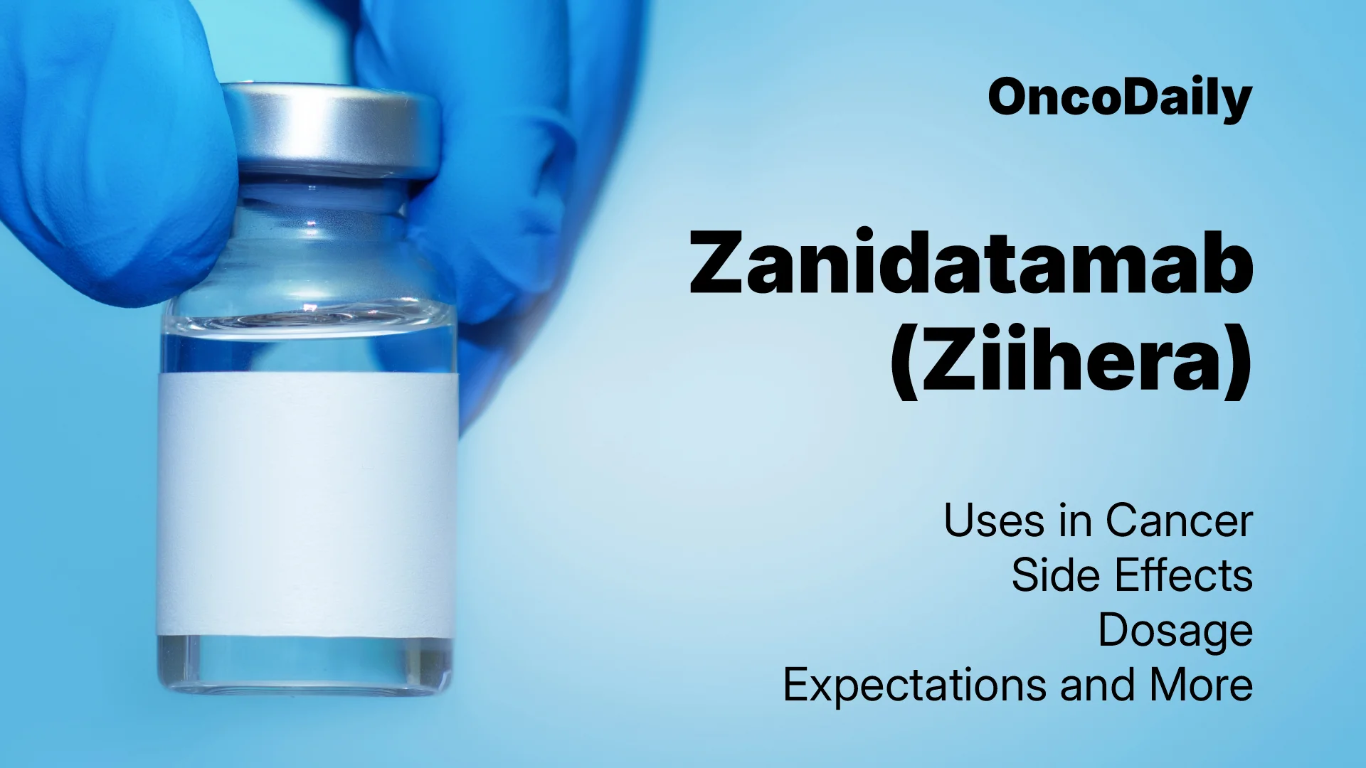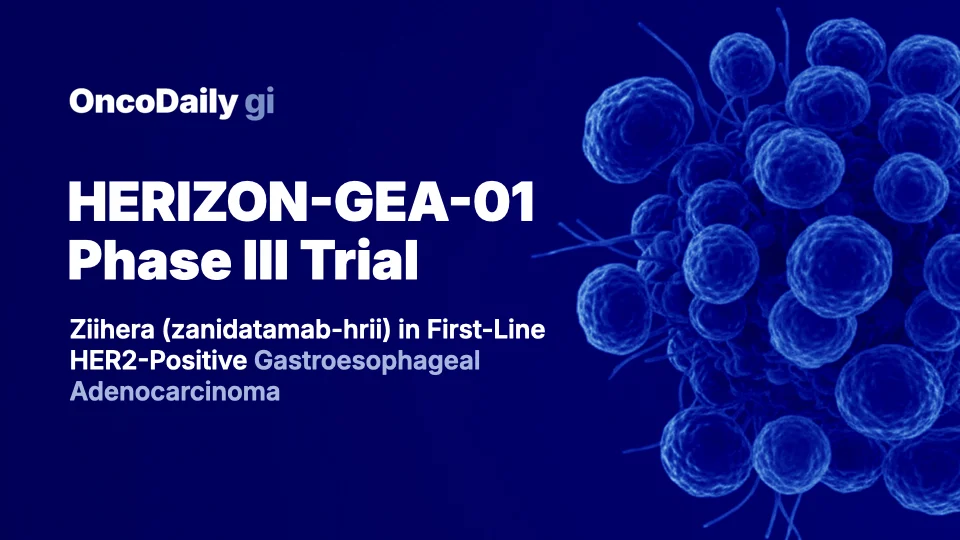HER2-positive gastroesophageal adenocarcinoma (GEA) remains one of the most aggressive and treatment-resistant malignancies worldwide. Despite the approval of trastuzumab nearly fifteen years ago, no HER2-directed therapy has been able to surpass it in the first-line metastatic setting. Numerous attempts—including pertuzumab combinations, HER2 tyrosine kinase inhibitors, and chemo-immunotherapy approaches—have failed to demonstrate a clinically meaningful survival advantage. The result has been a decade-long plateau in front-line outcomes for these patients.
The release of topline results from the HERIZON-GEA-01 phase 3 trial represents the most significant advance for this population since the TOGA trial established trastuzumab as the standard of care. Ziihera (zanidatamab-hrii), a bispecific HER2-targeted antibody designed to bind two distinct HER2 epitopes, has demonstrated statistically significant and clinically meaningful improvements in progression-free survival (PFS) and compelling overall survival (OS) signals when combined with standard chemotherapy. When paired with the PD-1 inhibitor tislelizumab, Ziihera produced even stronger survival outcomes, suggesting that the HER2–PD-1–chemotherapy triad may become the new backbone for HER2-positive GEA in the coming years.
You Can Also Read Tislelizumab (Tevimbra): Uses in Cancer, Side Effects, Dosage, Expectations, and More by OncoDaily.

A New Generation of HER2 Blockade
Ziihera distinguishes itself from trastuzumab, pertuzumab, and earlier HER2-targeted agents through its biparatopic design. By binding two non-overlapping extracellular sites on HER2, it induces dense receptor clustering, rapid internalization, and a more profound reduction in HER2 surface expression than single-epitope antibodies. This structural innovation enhances immune-mediated tumor cell killing through complement activation, antibody-dependent cellular cytotoxicity, and phagocytosis. The drug’s biological profile translates into deeper HER2 pathway suppression and more potent antitumor activity in preclinical models of GEA, which historically respond poorly to traditional HER2 blockade.
Trial Design and Patient Population
HERIZON-GEA-01 is a global, randomized, open-label study conducted across approximately 300 sites in more than 30 countries. It enrolled 914 adults with HER2-positive locally advanced unresectable or metastatic GEA who had received no prior systemic therapy in the metastatic setting. HER2 positivity was defined centrally as IHC 3+ or IHC 2+ with ISH amplification.
Participants were assigned to three treatment strategies: Ziihera with chemotherapy; Ziihera with both chemotherapy and tislelizumab; or the control regimen of trastuzumab plus chemotherapy. The trial’s dual primary endpoints were progression-free survival assessed by blinded independent central review and overall survival. Secondary endpoints focused on objective response rate, duration of response, and safety. The study was powered to detect superiority over the trastuzumab-based standard regimen.
“The topline results from HERIZON-GEA-01 represent a true turning point for patients with HER2+ gastroesophageal adenocarcinoma, marking real progress in an indication that has historically had limited treatment options and poor outcomes. These data highlight the potential of zanidatamab to transform the standard of care in HER2+ indications, demonstrate the strength of our Azymetric™ platform to engineer novel and differentiated multifunctional biologics, and reinforce the strategic value of our partnership strategy with Jazz and BeOne in bringing this critical therapy to patients worldwide.”

Kenneth Galbraith, Chair and Chief Executive Officer of Zymeworks.
Key Efficacy Findings
Topline data confirm that both Ziihera-containing regimens outperformed trastuzumab-based therapy. Ziihera combined with chemotherapy achieved a statistically significant and clinically meaningful improvement in PFS compared with trastuzumab and chemotherapy. At the time of the first interim OS analysis, the Ziihera-chemotherapy arm demonstrated a clinically meaningful overall survival advantage with a strong trend toward statistical significance. The next OS analysis is planned for mid-2026.
The triplet regimen—Ziihera, tislelizumab, and chemotherapy—produced the most compelling results. This combination not only improved PFS but also delivered statistically significant and clinically meaningful gains in OS, marking the first time a HER2-targeted agent has produced a superior survival outcome over trastuzumab in first-line metastatic GEA. Importantly, the survival benefit of the triplet was observed irrespective of PD-L1 status, indicating that Ziihera’s mechanisms of receptor downregulation and immune activation may broaden responsiveness to anti–PD-1 therapy even in PD-L1–negative tumors.
Both Ziihera regimens produced higher objective response rates and longer durations of response compared with the trastuzumab control arm, reinforcing the robustness of the survival findings. While granular numerical data will be reported at an upcoming medical meeting, the significance of the topline results is already clear.
Safety and Tolerability Profile
Across both experimental arms, the safety profile of Ziihera in combination with chemotherapy—either with or without tislelizumab—remained consistent with the known toxicities of the individual agents. No new or unexpected safety signals emerged.
Infusion-related reactions and diarrhea, commonly observed in earlier studies of Ziihera, occurred at anticipated rates and were largely manageable with standard supportive measures. Left ventricular dysfunction, a well-recognized risk of HER2-directed therapies, was infrequently observed and generally reversible with dose interruption or discontinuation, mirroring prior experience with the drug. The addition of tislelizumab did not lead to any disproportionate increase in immune-related adverse events.
These findings suggest that clinicians familiar with managing trastuzumab-based regimens will be able to adopt Ziihera-based therapy without major new toxicity burdens.

Read About Zanidatamab (Ziihera) on OncoDaily
Clinical and Strategic Implications
HERIZON-GEA-01 is a breakthrough moment in HER2-positive GEA. For the first time since trastuzumab’s introduction, a HER2-targeted therapy has not only matched but surpassed the historical standard. Ziihera’s ability to outperform trastuzumab in both doublet and triplet combinations signals a paradigm shift—one in which HER2-positive GEA may finally move beyond a decade of stagnant outcomes.
The magnitude of benefit seen in the Ziihera–tislelizumab–chemotherapy arm is particularly significant. It implies that Ziihera’s biparatopic HER2 blockade creates a tumor microenvironment that is especially receptive to PD-1 inhibition, offering a powerful biological rationale for replacing trastuzumab as the foundational HER2-targeted agent in this setting.
Jazz Pharmaceuticals has announced plans to file a supplemental Biologics License Application (sBLA) in the first half of 2026, and the company intends to pursue rapid inclusion in the NCCN Guidelines.
Context and Supporting Data
These findings build on earlier results from a phase 2 trial (NCT03929666) evaluating zanidatamab + chemotherapy in HER2-positive metastatic GEA. In that study, conducted in 41 patients, long-term follow-up at 48 months showed:
- Median OS: 36.5 months
- Median PFS: 15.2 months
- ORR: 83.8%
- Median DOR: 20.4 months
This strong efficacy signal provided early evidence that zanidatamab may outperform trastuzumab in the frontline metastatic setting.
The Road Ahead
HERIZON-GEA-01 is the first phase 3 readout for Ziihera, but the drug’s development program is broad. Additional phase 3 studies are underway in HER2-positive biliary tract cancer (HERIZON-BTC-302) and in metastatic breast cancer post-T-DXd (EmpowHER-303). Basket trials such as DiscovHER PAN-206 and EmpowHER-208 are exploring the agent across multiple HER2-driven tumor types.
If results across these programs continue to be positive, Ziihera could emerge as a new HER2-targeted backbone across solid tumors, similar to how trastuzumab transformed HER2-positive breast cancer two decades ago.
Zanidatamab is currently being evaluated in several additional trials across HER2-positive malignancies:
- HERIZON-BTC-302 (Phase 3): HER2-positive biliary tract cancer
- EmpowHER-303 (Phase 3): Metastatic HER2-positive breast cancer post-trastuzumab deruxtecan
- DiscovHER PAN-206 (Phase 2): Previously treated HER2-positive solid tumors
- EmpowHER-208 (Phase 2): Neoadjuvant HER2-positive breast cancer
Conclusion
HERIZON-GEA-01 provides the strongest evidence to date that Ziihera may replace trastuzumab as the frontline standard of care for HER2-positive gastroesophageal adenocarcinoma. Its dual-epitope HER2 targeting and enhanced immune activation appear to translate into meaningful clinical outcomes, including improved survival, deeper tumor responses, and sustained benefit across PD-L1 subgroups.
Pending regulatory review, Ziihera has the potential to redefine first-line therapy for HER2-positive GEA and to reshape the therapeutic landscape for HER2-driven solid tumors more broadly.


